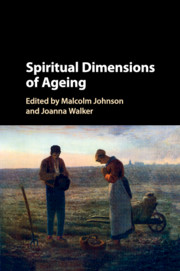Book contents
- Frontmatter
- Contents
- List of Contributors
- Preface
- Acknowledgements
- 1 Spirited Ageing
- Part I The Spiritual Journey of Ageing
- Part II Cultures of the Spirit in Modernity
- Part III Searching for Meaning in Later Life
- 10 Religion, Faith, Belief and Disbelief in Old Age: “A full-hearted evensong”
- 11 Finding Meaning and Sustaining Purpose in Later Life
- 12 Spirituality, Biographical Review and Biographical Pain at the End of Life in Old Age
- 13 Embracing Contraries: The Spiritual Quest as a Lifelong Process
- Part IV Meeting Spiritual Needs in Older Age
- Index
- References
12 - Spirituality, Biographical Review and Biographical Pain at the End of Life in Old Age
from Part III - Searching for Meaning in Later Life
Published online by Cambridge University Press: 22 December 2016
- Frontmatter
- Contents
- List of Contributors
- Preface
- Acknowledgements
- 1 Spirited Ageing
- Part I The Spiritual Journey of Ageing
- Part II Cultures of the Spirit in Modernity
- Part III Searching for Meaning in Later Life
- 10 Religion, Faith, Belief and Disbelief in Old Age: “A full-hearted evensong”
- 11 Finding Meaning and Sustaining Purpose in Later Life
- 12 Spirituality, Biographical Review and Biographical Pain at the End of Life in Old Age
- 13 Embracing Contraries: The Spiritual Quest as a Lifelong Process
- Part IV Meeting Spiritual Needs in Older Age
- Index
- References
Summary
The human spirit is capable of responding to the whole range of emotions and experiences that form the lifespan of an individual. It is the agency that registers emotions across the whole spectrum; from the elation of joy at wondrous experiences, events, achievements and relationships, to the despair and degradation of profound pain and loss. Whilst most of us are treated to great pleasures and exquisitely lofty emotional highs on occasions, some live lives of endless oppression and cruel misuse. So reflecting on our past lives, as we all do, may be affirming and pleasurable. It may be harrowing, painful, full of guilt and anger. Or it may be a mixture of these two extremes, with the mix changing at different times and in different circumstances. As we get closer to the end of life this life review and self-evaluation becomes more frequent and more problematic.
In his prize winning novel, The sense of an ending (2011) Julian Barnes plots the lives of four bright eighteen-year-old young men as they prepare themselves for university. They are bonded friends who are being taught history and philosophy by an exceptional teacher. So they compete to be reflexively clever. Their tangled student lives and an unexplained suicide receive detailed attention. But their adulthood, the middle part of their lives, is passed over with only the merest of narratives. The heart of the book focuses on Tony, who says of himself in old age:
What did I know of life, who had lived so carefully? Who had neither won nor lost, but just let life happen to him? Who had the usual ambitions, and settled all too quickly for them not being realised? Who avoided being hurt and called it a capacity for survival? Who paid his bills, stayed on good terms with everyone as far as possible.
Tony concludes: ‘You get to the end of your life – no, not life itself, but something else: the end of any likelihood of change in that life. You are allowed a long moment of pause, time enough to ask the question: what else have I done wrong? … (p. 142) There is accumulation. There is responsibility. And beyond these, there is unrest, There is great unrest …’
(pp. 149–150).- Type
- Chapter
- Information
- Spiritual Dimensions of Ageing , pp. 198 - 214Publisher: Cambridge University PressPrint publication year: 2016
References
- 3
- Cited by

